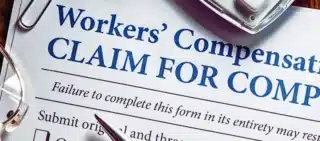
Common Reasons an Employer Won't Report Your Work Injury A total of 101,400 non-fatal work-related injuries and illnesses occurred in...


One of the first questions prospective clients ask our workers’ compensation lawyers in Bloomington is, “Am I eligible for workers’ comp?”
If you were injured on the job or a workplace hazard caused you to become ill, you are likely eligible for workers’ compensation benefits in Illinois. Although there are a few exceptions, almost all employees in the state are entitled to workers’ comp.

With few exceptions, employers with at least one worker must carry this coverage for full- and part-time employees, minors, and temporary workers.
In Illinois, to qualify for workers' comp benefits, you must:
More specifically, eligibility criteria includes:
Aa an employee, you must have suffered the injury while performing the duties of your job. It can be challenging to prove that the injury occurred while the employee was acting within the scope of their employment, especially if the injury happened outside the workplace or during non-working hours. In such cases, it is advisable to seek the guidance of a workers’ compensation lawyer at our law firm, who can assist in proving this requirement.
Employers carry workers' compensation insurance to protect employees who are injured on the job. A valid claim requires an employment relationship between the two parties. Depending on the circumstances of employment, some independent contractors may be covered by workers’ compensation policies. Most are excluded from coverage, however.
Employees are eligible for workers' compensation if they suffer losses, such as medical expenses, lost income, diminished ability to work, pain and suffering, or other damages that can be proven.
In Illinois, an employee must report work injuries to the employer within 45 days. To do this, follow your employer’s policies and procedures, and provide notice of the injury in writing so that it is documented.
Do you get workers' comp if it's your fault? It depends on the nature of the accident. There are certain situations or conditions that may preclude an injured employee from claiming workers' comp. For instance, if you were involved in illegal activities while on the job, acted recklessly or violated company policies, caused self-inflicted injuries, or demonstrated willful misconduct. Willful misconduct can refer to reckless behavior, misconduct, failure to adhere to safety rules, or getting injured due to horseplay or carelessness.
If you were intoxicated, and your intoxication was the primary reason for an accidental injury, you may not be entitled to compensation. In cases where an employee's blood alcohol level was above .08%, or if the employee had illegal drugs in his or her system, it is presumed that the intoxication was the main cause of the injury. However, this presumption can be challenged.
Your employment status impacts your ability to claim workers’ compensation benefits. To be eligible for such benefits, you must be employed by someone. There are instances where an individual performs work for another person, but does not have an employer-employee relationship. For example, they are not considered employees when hired as an independent contractor and, therefore, cannot file a workers' compensation claim.
To determine whether someone is an employee or an independent contractor, the presence of an employment contract and whether the worker uses his or her own tools and equipment for the job are often considered.
Workers’ comp covers almost all work-related injuries and illnesses, including pre-existing conditions that worsen due to work. It also covers a wide range of injuries that may occur while you are at work. Common injuries include:
It is common for workers to experience slips and falls on the job due to equipment, debris, or other obstacles in their path. These accidents are the most frequent type of workplace incident, and can result in severe injuries. Poor maintenance and insufficient cleanup are often the root causes of such incidents.
Workers can get injured while working at heights. For example, they might be working on scaffolding and fall off it if they are not properly harnessed. This can result in serious, or even life-threatening, injuries. These accidents can occur at various locations and due to numerous causes.
Various types of vehicle accidents can occur while on the job, regardless of whether they happen on or off-site. These accidents may involve company vehicles or privately owned vehicles. For instance, an employee could have an accident in their own vehicle while on a delivery, while another employee operating a forklift in a company warehouse might have an accident.
Workers can suffer from overexertion injuries while on the job, which can be caused by heat exhaustion, working for extended hours without taking a break, or performing tasks that involve heavy lifting or other stressful activities. These types of injuries are prevalent across various industries, ranging from construction to agriculture.
Repetitive stress injuries are caused when employees repeatedly perform the same motion over an extended period of time. Manual labor workers are typically more prone to these injuries due to the repetitive nature of their work. Injuries can occur from motions such as heavy lifting, frequent moving, and other activities requiring the same body part to be used repeatedly.
There are a couple of ways in which objects in the workplace can cause harm to workers. The first is when something strikes workers into other objects, which can result in injuries such as broken bones, fractures, amputations, or traumatic brain injuries.
The second way objects in the workplace may cause harm is when they fall onto workers. This can occur when pieces of loose equipment or machinery fall, or when entire structures collapse. These types of accidents can cause severe and potentially fatal injuries to workers.
In Illinois, filing your workers' compensation claim will typically involve these steps:
Inform your employer about any work-related injuries as soon as possible. In Illinois, you have a maximum of 45 days from the date of injury to report it to your employer, otherwise, you may lose your eligibility for workers' compensation. Prompt notification of your employer will help you initiate the paperwork required for filing a work injury claim, which is generally beneficial for your best interests.
If you delay in reporting your injury to your employer for more than 45 days, the insurance company may refuse to pay your claim. They may claim that your injury occurred after the accident or that your condition worsened due to your delayed reporting.
Once you have notified your employer about your injury, they should refer you for medical evaluation and appropriate care.
Seek medical attention after an injury, even if your injuries don't seem severe. A doctor can assess the extent of your injuries and provide an opinion about when you can return to work. They will also determine when you have reached maximum medical improvement, which is important when seeking compensation.
To ensure you receive maximum compensation, it's essential to collect as much evidence as possible. Seeking medical attention immediately after the injury creates a link between your work and the illness or injuries that you have suffered. Documenting your treatment will show how your injuries or illness have affected your daily life, as well as our medical expenses, which is essential when determining the value of your workers' compensation claim.
Work with your attorney to ensure the application is completed accurately. Once the application is complete, you will need to provide a copy to your employer and submit the original to the appropriate state agency. In the state of Illinois, you must deliver signed copies of the application to the Illinois Workers’ Compensation Commission. In Illinois, you have a maximum of 3 years to file your workers' compensation claim from the date of your injury .
If your claim is denied, you may appeal. If your claim is approved, you will be offered an amount of compensation, which can be a lump sum, or structured payments over a period.
If you receive a workers' compensation offer that you feel is insufficient, you are not obligated to accept it. You have the right to negotiate for a higher amount. To ensure a fair settlement, it is advisable to hire a workers' compensation attorney. If you are unable to reach an agreement, you can take the case to trial.
In Illinois, it takes about 14 days to receive a workers' comp settlement check after your claim is finalized.
One of the benefits of hiring a workers’ comp lawyer is that he or she will help you follow these steps to ensure a successful claim.
Illinois workers' compensation benefits include medical care, temporary and permanent disability benefits, and survivor benefits for families of deceased workers.
Employees who get injured in Illinois have the right to receive necessary medical attention to heal or reduce the effects of their injuries. Workers’ comp provides compensation for associated medical costs. This includes a wide range of healthcare expenses such as first aid, transportation (including ambulance), emergency room and hospital bills, doctor visits, prescription medication and treatments, medical devices, and institutional care. Although the language is a bit vague, this generally covers most of the healthcare costs incurred by the injured employee.
If you are unable to work due to injuries or illnesses, you may be eligible for temporary total disability (TTD) benefits. A TTD claim is used when an employee is incapable of working for a while due to his or her injuries or illnesses, or if the employer cannot provide modified light-duty work that accommodates the physical limitations.
Injured workers can receive 66.6% of their average weekly pay, and they will not receive lost wages for the first three days unless they require at least 14 days of work off. The state also sets a maximum amount of compensation (which changes bi-annually); you can receive TTD benefits until you reach maximum medical improvement (MMI), which refers to the point where your doctor believes your condition has improved as much as possible with treatment.
When a worker gets injured or sick due to the job and needs assistance returning to work, he or she may file a vocational rehabilitation claim to receive such support. This claim can cover expenses related to retraining and other services that can assist the worker in finding a new job if required. The primary purpose of this claim is to help the worker regain employment quickly after reaching MMI so that he or she can start earning a salary again and become self-sufficient instead of depending on workers' compensation benefits for an extended period.
To discuss your eligibility for workers’ comp after an on-the-job accident in Bloomington, call our attorneys at Strong Law Offices at (309) 393-2928.

Common Reasons an Employer Won't Report Your Work Injury A total of 101,400 non-fatal work-related injuries and illnesses occurred in...

At Strong Law Offices, we have a team of workers' compensation lawyers who understand the financial setbacks and physical limitations...

Common Equipment Involved in Run-Over Accidents Illinois job sites, from construction zones to industrial plants, depend on machinery to stay...